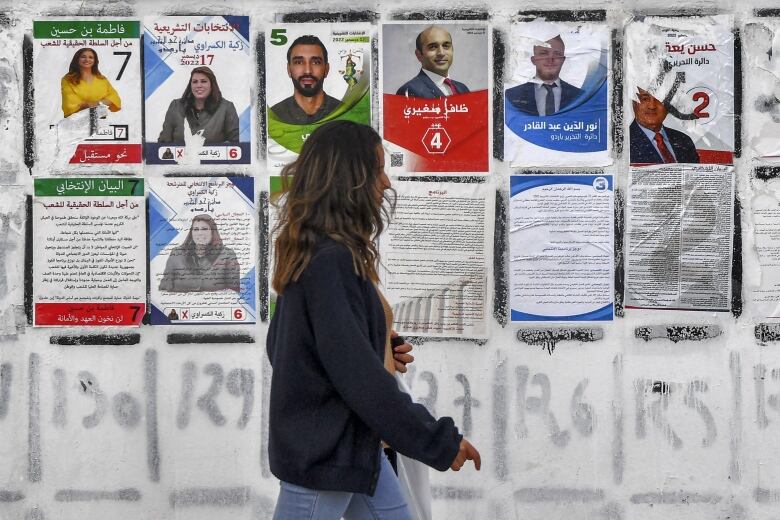[ad_1]
To the surface world, Saturday’s elections in Tunisia increase a number of pink flags.
Many opposition events are boycotting them, overseas media are banned from speaking to candidates and critics say the brand new electoral legislation makes it tougher for girls to compete.
However many Tunisians consider their nation’s decade-old democratic revolution has failed, and are exasperated with its political elites. They welcome their more and more autocratic president’s political reforms and see the vote for a brand new parliament as an opportunity to resolve their monetary disaster.
“The final 10 years have been disastrous for all Tunisians,” mentioned 41-year-old Aymen Yaakoubi, who works as a chef. “It was not a revolution, however a quagmire, as a result of the state disintegrated.”
The elections will happen 12 years to the day after Tunisian vegetable vendor Mohamed Bouazizi set himself on fireplace in an act of protest over financial situations that sparked the Arab Spring.
The North African nation was the one nation to emerge from the Arab Spring protests with a democratic authorities, which changed longtime autocrat Zine El Abidine Ben Ali. However there’s been a lot backsliding since.
Parliament final met in July 2021. President Kais Saied then froze the legislature and dismissed his authorities after years of political impasse and financial stagnation. He dissolved parliament in March.
He additionally curbed the independence of the judiciary and weakened parliament’s powers.
Saied — who was elected in 2019 with great fanfare due to his outsider status — nonetheless enjoys the backing of greater than half of the voters.
In a referendum in July, Tunisians authorised a structure that fingers broad govt powers to the president. Saied, who spearheaded the undertaking and wrote the textual content himself, made full use of the mandate in September, altering the electoral legislation to decrease the function of political events.
Weakening of events
The brand new legislation reduces the variety of decrease home of parliament members from 217 to 161, who at the moment are to be elected straight as a substitute of by way of a celebration checklist. And lawmakers who “don’t fulfil their roles” may be eliminated if 10 per cent of their constituents lodge a proper request.
Saied’s critics accuse him of an authoritarian drift and of endangering the democratic course of.

Sghaier Zakraoui, just like the president himself, is a distinguished legislation professor. He was one of many first to return out in assist of Saied’s strikes to pay attention energy in his personal fingers. However over the previous 12 months, he has modified his thoughts.
Zakraoui describes Saturday’s polls as a “non-event.” The election is a part of the president’s “private journey,” he mentioned. “He imposed his structure and his electoral legislation, which is able to result in a failure of the president.”
Critics say the electoral legislation reforms have hit ladies significantly arduous. Solely 127 ladies are among the many 1,055 candidates operating in Saturday’s election.
Neila Zoghlami, president of the Tunisian Affiliation of Democratic Ladies, mentioned the electoral legislation “doesn’t meet the aspirations of Tunisian ladies.” She argued that utilizing lists of particular person candidates — as a substitute of occasion lists — boosts male candidates, as a result of many Tunisians are nonetheless reluctant to vote for girls.
“We all know very properly the social and cultural surroundings during which males dominate,” Zoghlami mentioned. “We’re acutely conscious that Tunisian or Arab ladies nonetheless undergo from discrimination and inequality earlier than the legislation.”
Financial pressure
Many see Saturday’s vote as an opportunity to elect a neighborhood candidate who will are inclined to their group’s wants within the nationwide legislature, thus breaking a circle of damaged guarantees from central candidates who care little for his or her constituents’ fortunes.
“Many candidates got here from afar asking [us] to vote for them, and we elected them,” mentioned Faouzia Tlili, 60, who runs a fast-food restaurant in Ariana, a northern suburb of the capital, Tunis.
“They promised to make use of our kids and restore the roads, and once they grew to become lawmakers, they forgot their guarantees,” Tlili mentioned. “We wish an individual from the area who is thought to all of the inhabitants of the neighbourhood and is near the residents.”
LISTEN | From June 2022:
The Present23:58Tunisian president seeks to consolidate energy a decade after Arab Spring
Throughout the Arab Spring, Tunisians had been excited in regards to the obvious daybreak of democracy of their nation. However a decade later, that hope is being dashed because the president seeks to consolidate energy. We be taught extra from Ghaya ben Mbarek, a journalist for the impartial information website Meshkal; Aya Riahi, an anti-corruption activist with the youth-driven NGO, I-Watch; and Sami Hamdi, the managing director of the worldwide danger and intelligence firm Worldwide Curiosity.
Malika Mahfouf, 43, one other Ariana resident, mentioned she was extra involved with hovering meals costs and shortages of primary items than with deteriorating rights for girls — who she mentioned show themselves equal to males within the day by day battle for survival.
“They each work and so they combat, particularly within the present state of affairs of financial disaster, which is extreme,” Mahfouf mentioned.
With many opposition events boycotting the polls, together with the Salvation Entrance coalition that the favored Ennahda occasion is a part of, it is not clear that the elections will result in the political and financial stability that the president is looking for to create.
